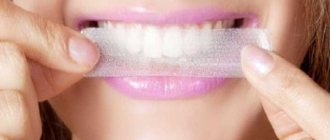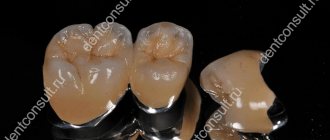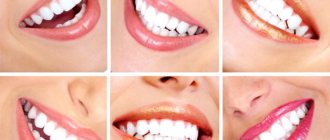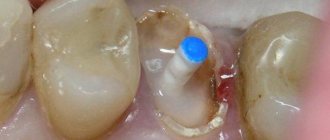Publication date: 03/18/2021
A smile is part of nonverbal communication that is understandable to anyone. Some emotions simply cannot be expressed without a smile. According to research by American scientists:
- 75% of respondents would not want to do business with sad people
- 58% think moody people are hiding something
- 70% would not consider making friends
- 55% would not start working with a gloomy person
With the help of a smile, we invite people to communicate, make friends, thank them, and apologize. A snow-white radiant smile is an indicator of health, beauty and self-confidence. Those with an attractive smile achieve great success not only in their personal lives, but also at work.
The most important component of a contagious smile is straight and white teeth. They are an indicator of health and success. A smile can be light, not exposing your teeth, but when you laugh, you definitely won’t be able to hide them. Therefore, people begin to care about the beauty of a smile in their youth.
Unfortunately, not all people have straight and snow-white teeth. Curvature may appear in childhood, and yellowness may even be an individual feature. Fortunately, dentistry now offers several ways to solve problems with a less-than-perfect smile. For example, veneers or lumineers are installed.
Veneers
Veneers are thin ceramic shells that are attached to the front teeth. To do this, the teeth are ground by 0.3 - 1 mm. Typically, veneers are used to correct not only the color, but also the shape and curvature of teeth. For example, if the teeth are too large or protrude too much forward, and also have interdental gaps.
Veneers are made from ceramics using digital technology. They have high strength, resistance to heat and various types of erosion. Their thickness is 0.3 - 0.6 mm. These veneers can be translucent or opaque.
The service life of veneers ranges from ten to fifteen years. They do not require special care.
What types of veneers are there and why are their prices so different?
They can be divided into four groups:
First group of veneers
- these are direct restorations that are made with a composite in the mouth, that is, these are the so-called composite veneers,
Second group
- these are also composite veneers, but they are already made by a technician, that is, in a laboratory. In this case, the patient either has the surface of his teeth scanned, or impressions are taken of him and the technician makes composite veneers,
Third group
— veneers made using CEREC technology. Their manufacture requires digital scanning and modeling in a special program. The digital data is then transferred to the CEREC digital milling machine, and the production of veneers begins on the day of the patient's visit to the doctor. That is, CEREC veneers are veneers in one visit to the doctor, one might say veneers in an hour:
And the fourth category of veneers
- these are Emax ceramic veneers, for the production of which the teeth in the mouth are also scanned, or impressions are taken and a technician in the laboratory makes these veneers from ceramics on models.
Veneer installation process
Veneers are made to order. Therefore, they perfectly follow the dentition and are not felt at all when worn. At the first visit, an impression of the patient’s teeth is made, it is decided how many teeth the prosthesis will be installed on, and its shade is determined.
To select the optimal color and shape of veneers that suit you, the doctor uses a computer design method. He takes a photo of a smiling face and uses modeling to determine the necessary parameters. You can imagine in advance how suitable the shade and shape of the veneers you have chosen will be.
To install veneers, teeth must be ground down. This is also done at the first appointment. Temporary veneers are then installed, as the wait for the original can be several weeks.
At the next appointment, the dentist removes the temporary veneers and tries on new ones. If they fit perfectly, he places them on special glue:
- A composite material is applied to the treated dentition, the shade of which is selected in advance;
- veneers are fixed and excess material is removed;
- If necessary, grinding is carried out according to the bite.
Dental procedures for a beautiful smile
Some dental problems are easier to solve with dental manipulations and procedures. This:
- return of the lost whiteness of enamel;
- restoration of tooth tissue with composite materials.
A dull or yellow tint to the enamel is often a cosmetic and easily corrected defect. Modern methods of whitening, as well as remineralization of teeth, will help to cope with it. You should agree to whitening and applications with calcium-containing compounds if the color has deteriorated due to:
- taking antibiotics or other medications;
- the appearance of fluorosis - yellow or white matte spots on tooth enamel.
Restoration with composite materials is used when it is necessary to build up a crown. The procedure is similar to simple filling and is carried out only if there is a healthy root. High-quality treatment allows you to achieve ideal anatomical similarity and whiteness without veneers or crowns.
Pros and cons of installing veneers
Veneers can eliminate dental defects, however, they have their positive and negative sides.
The advantages include the following:
- With the help of veneers, you can correct quite severe deficiencies: crooked teeth, enlarged interdental spaces, severe chips.
- correction of the color of teeth if they are pigmented or have an unattractive yellow tint from nature.
The disadvantages of using veneers include grinding off the upper layers of enamel, which entails increased tooth sensitivity. In addition, installing veneers is an irreversible process. After the expiration of the period of use, it is necessary to order new implants.
Removable veneers – what are they and how to use them? How justified is such a purchase?
In pursuit of a flawless smile, many are often tempted by the advertising promises of manufacturers of inexpensive removable veneers. In such cases, most often we are talking about budget cosmetic mouthguards made of plastic or sets of template plates, which you need to attach to your teeth yourself using dubious glue from the packaging. Both options have many significant disadvantages. Therefore, in today’s article we will talk in detail about whether it is possible to insert removable veneers yourself and whether they are worth using at all.
Contraindications for installing veneers
There are not many contraindications to installing veneers. One of them is installation up to sixteen to eighteen years of age. At this age, the formation of the bite, enamel and teeth is still underway.
Another contraindication is teeth that are too damaged. In this case, there is simply no need to attach a microprosthesis. Here you will have to install an all-ceramic crown. However, if the teeth have been damaged by cervical caries and then restored and filled with aesthetic restoration, then they can be covered with veneers.
Each case is individual and the question of what to choose for correction: veneers or lumineers is decided by the doctor together with the patient.
Star Smile aligners - a beautiful smile without damaging your teeth
Anna
: I've been wearing aligners for a year now. There are no complaints about the system. I can easily take them off, put them on, brush my teeth, and eat them. Many people don't even notice that I'm wearing anything.
Maxim Arkashov
: We simply, when we stop at this stage, patients leave satisfied and happy that they did not have their teeth drilled or spoiled the enamel of their teeth. And, accordingly, they live with their teeth in a more correct position, which in turn greatly improves the prognosis for the proper functioning of these teeth.
Anna's smile - as a result of treatment with aligners
Anna
: I am grateful to Maxim Vladimirovich that he recommended the Star Smile system to me, and we solved my problems without damaging my teeth.
In conclusion, what is the best way to straighten your teeth?
As you know, there are several methods, but the main ones are braces, aligners and veneers. In the first two cases, we are really talking about correcting the bite, and veneers are, say, only cosmetic work. But the question still remains - WHAT to choose, what braces to put on? Or stick with aligners? comparative analysis may come in handy
these methods of treating malocclusion. More than 70 parameters (!), but the material is very easy to read. And we hope it will help you make your choice.
For children
— the main methods of correcting malocclusion are plates, myofunctional trainers, functional devices and “2x4 braces.” You can read about the pros and cons of these methods HERE.
Lumineers and their features
Lumineers are thin plate-shaped plates 0.2 to 0.3 mm thick made of ceramic that are fixed to the front teeth. The wear life is more than twenty years.
Lumineers are used to correct minor dental defects. Such as: pigmentation, small chips, unattractive shade.
Any implants are installed only on healthy teeth. Therefore, if caries is present, it must be cured.
Lumineers can be installed in just two visits to the dentist.
- At the first appointment, the doctor performs an examination, takes dental impressions and determines the shade of future implants. Sends the impression to an American laboratory, where lumineers are made using the patented Cerinate technology.
- At the second appointment, the dentist performs a professional teeth cleaning. Then the finished lumineers are tried on and installed. The doctor applies etching and primer to the enamel. The inside of the lumineer is coated with a fluoride-enriched composition that strengthens dentin and makes the lumineer resistant to high acidity. The procedure is performed under multiple magnification using a dental microscope. This guarantees the highest precision of implantation. After placing the lumineers on the teeth, the composite solution is dried using a curing lamp. Then the excess cement is removed. The procedure for installing lumineers is complete.
How are lumineers installed?
Installing lumineers does not take much time. The patient only has to make a couple of visits to the dentist.
- For the first time, the doctor conducts a thorough examination of the oral cavity and decides how many veneers will be installed. After this, the specialist makes an impression, which he subsequently sends to the laboratory that produces the plates.
- On the second visit to the dental clinic, the tooth enamel is cleaned using a special paste, and the plates are fixed to the teeth with cement. All these manipulations are performed without prior anesthesia.
Pros and cons of installing lumineers
Lumineers correct the color of teeth and correct minor external defects. For example, small chips and slight curvature. However, they cannot sustain serious damage, and in this case it is better to seek installation of veneers.
Another important disadvantage is the price of lumineers. Due to the fact that they will be manufactured using patented technology only in specialized American laboratories, the cost of lumineers is 2-3 times higher than the price of veneers.
However, the advantages of lumineers are undeniable. The most important thing is that there is no need to grind the teeth. This way you can always remove microprostheses and return to their original state.
An important feature of lumineers is their color. They have a matte surface. This makes the smile snow-white and “Hollywood”, however, it does not look entirely natural.
Also, in some cases, if the patient has large teeth, lumineers will add even more volume.
Which is better to choose?
To begin with, it is worth deciding which characteristics are a priority for the patient.
But basically it all comes down to 2 points when choosing.
Veneers look more natural. Such plates are ideal for patients whose professional activities involve public speaking.
The financial situation of the patient also plays a big role in the choice between veneers and lumineers. As you know, the cost of lumineers is quite high.
Lumineers or veneers - making a comparison
The difference between veneers and lumineers is as follows:
- veneers are thicker, so you need to grind down the top layer of the tooth
- Lumineers last 10-15 years longer
- veneers look more natural
- Lumineers are much more expensive
Depending on the goals and budget, the patient makes a choice towards one type of prosthetics or another.
In addition, over the years, a small gap may form at the junction of the gum and the veneer attachment, where food debris will accumulate. This can cause caries. Treating caries on teeth with installed veneers is much more difficult and expensive.
Veneers 360 – crowns on teeth
Many dental clinics announce. Its essence is complete coverage of the tooth surface with metal-free ceramics. In fact, this is full-fledged prosthetics using a crown. The whole difference lies only in the intensity of grinding - only enamel or deeper intervention.
Ceramic crowns are an excellent option for correcting the shape and color of a tooth. The result is indistinguishable from neighboring units and is more resistant to external influences.
Methods of aesthetic and orthodontic dentistry allow you to choose the optimal alternative to dental veneers - giving the patient’s smile health and charm. When choosing a treatment method, it is important to completely trust the doctor - you need a professional for whom the patient’s interests come first. The independent rating of the 1dentist portal will help you find a professional, where reviews are real opinions of people after treatment and communication with dentists in Moscow clinics.
What is more expensive: veneers or lumineers?
A short table of price comparisons in Moscow.
| Name of dentistry | Price per tooth, rub. |
| Dental Implantology Center |
|
| Smile studio |
|
| Novadent |
|
| Dentistry "Beauty and Health" |
|
| Smile-at-Once |
|
What makes Enamel Plus special
Enamel Plus is the first nanocomposite material with optical characteristics similar to natural teeth. This gives the dentist the opportunity to make restorations that are absolutely indistinguishable from natural tooth tissue.
The transition boundary from the restored part of the tooth to natural tissues is not visible in any light
The unique properties of the material were achieved through the inclusion of zirconium dioxide nanoparticles (12%) and glass filler, which has a high refractive index (68%) in the filler composition.
The total proportion of inorganic filler is about 80%, making Enamel Plus durable, abrasion-resistant and suitable even for volumetric restorations.
When light hits a tooth, part of it is reflected, and part is absorbed, part is scattered within the tissue, and part passes through. Moreover, this happens differently in enamel and dentin, since their optical properties are not the same.
Questions and answers
Is it true that empress veneers installed in your clinics do not require grinding or removal of enamel?
Good afternoon Please tell me, is it really true that the empress veneers installed in your clinics do not require grinding and removal of enamel? In connection with what?
Hello! To install Empress veneers, grinding of the enamel is required to better attach the veneer and give the teeth an anatomical shape, but the grinding is not as deep as when installing other types of veneers, since Empress veneers are ultra-thin plates made of a unique high-strength material. You can find out more detailed information about the properties of Empress veneers and the features of their installation during a free consultation with our orthopedists. You can make an appointment by calling + 7 (495) 789-42-02. Sincerely, Patient Support Center SIMPLADENT++8 800 333-53-41
Is it possible to hide or disguise a crooked tooth with a veneer?
Good afternoon Tell me, is it possible to hide/disguise it with a veneer if a tooth is crooked? On my right, the fang goes inside the jaw. I don’t want to get braces, and I can’t afford the money for mouthguards. It seems like the solution is veneers, but I need your preliminary advice.
Hello! Theoretically, such defects can be corrected by installing veneers. However, only a doctor can answer you for sure based on the results of the examination. Come to our specialists for a free consultation, the doctor will explain to you all the details of veneer prosthetics and write out a treatment plan indicating the cost. Our clinic uses highly aesthetic Empress veneers made from ultra-strong ceramics. For more details and to sign up for a free consultation, please call +. Sincerely, Patient Support Center SIMPLADENT++8 800 333-53-41
Other questions
Other jobs
Intraoral scanner ensures optical accuracy of aligners
To make the aligners, we used an intraoral scanner, which was used to take optical impressions. That is, the camera takes many pictures, which are stitched into a 3D image in a special program. And this 3D image is sent to the laboratory, bypassing transport and time losses, bypassing shrinkage and all kinds of force majeure circumstances - hypothermia of the impression masses. Accordingly, we get a more accurate, more predictable result.
Anna
: The teeth scanning took place there for 15 minutes. And a week later, at a follow-up appointment, I was able to immediately see how my teeth would move.
Doctor Arkashov
: That is, by the time we received the result from the laboratory with the final treatment plan, we had not yet done anything to our patient. The result that we get after aligners will be appreciated by the patient. And we, as a rule, allow you to look at the result of orthodontic treatment. And many patients are satisfied with it.
Examples of work “Before” and “After”
Restoring aesthetics with lumineers
Case: the patient complained of unsatisfactory aesthetics of the anterior teeth (yellow enamel, curvature).
Aesthetic restoration of anterior teeth - lumineers
Case: the patient complained about the unsatisfactory aesthetics of his smile (he was not satisfied with the color and shape of the teeth), since the teeth were not affected by caries, the curvature was small, the patient chose the most non-traumatic restoration option - installing lumineers without grinding and depulping the teeth.
How do composite light-curing materials work?
Enamel Plus belongs to the group of composite materials and, like others, it uses two main components - an organic matrix and an inorganic filler. The organic matrix of all materials is approximately the same - it is a monomer, which becomes a polymer under the influence of radiation, as well as catalysts, dyes and activators.
The main differences between restoration materials are determined by the choice of inorganic filler. Typical “fillers” are quartz, various types of glass, zirconium, etc. The particles vary in size, shape and can be mixed in different proportions.
For a long time, manufacturers of materials for direct dental restoration have been faced with a dilemma: to make the material beautiful or durable. The fact is that the more inorganic filler, the stronger the material, but the less transparent it is, the less polished it is and the faster it loses its aesthetic properties. This occurs due to the loss of relatively large particles of filler from the surface of the filling; at the microscopic level, this looks like “pores”.
In the early 2000s, nanocomposite materials appeared, which included very small filler particles (0.1-100 nanomicrons in size). This made the restoration materials more uniform, transparent and easy to polish. At the same time, aesthetic qualities were achieved without compromising the strength of the material.
Dentist works like an artist
If someone thinks that teeth are simply gray, white and “ivory-colored”, then they are very mistaken. Teeth are multi-colored and Enamel Plus has special cards for correct color selection.
The Enamel Plus set of materials is similar to a palette and makes it possible to create a tooth with any color characteristics.
The set contains 9 dentin colors, including for whitened teeth. Dentin is not as transparent as enamel and has a more pronounced color.
For materials imitating enamel, it is much more important to select the required transparency, so the kit includes three types of enamel: transparent (for young teeth), medium and dense. There are also special types of enamel for chewing teeth, which are more durable and less transparent, which is characteristic of natural lateral teeth. Another type of enamel to give the tooth characteristic individual features: spots, stripes and imitation of cracks.
Paints and special brushes have been developed for working with Enamel Plus materials, which gives the doctor enormous scope for creativity. Layer by layer, step by step, the tooth is created.
Price question: how much does it cost to install veneers?
As we already said, dental veneers are not cheap, but they are worth it!
Approximate cost of microprostheses:
- Composite ones are the most budget-friendly. The cost of one unit is approximately 7 thousand rubles;
- Ceramic microprostheses, which are manufactured in a dental laboratory, cost approximately 20 thousand rubles per unit;
- Ceramic dental veneers made at the 32 Dent clinic will cost the patient about 15 thousand rubles per unit;
- Lumineers are the most expensive - from 50 thousand rubles per unit.
Who is recommended for veneers and who is not?
In principle, any patient can get dental veneers if they have the funds and the desire. Most often, veneers are installed on teeth for the following reasons:
- not satisfied with the natural color of your teeth;
- there are stains or microcracks on the tooth surface that you want to disguise;
- if there are three (small distances a few millimeters wide);
- in cases where teeth are prone to increased wear at the edges;
- if there are minor orthodontic defects, for example, the tooth is slightly rotated, or mild crowding is diagnosed.
Note!
Even the most modern whitening technologies are not able to give tooth enamel such impeccable whiteness as microprostheses. That is why more and more patients are inclined to install veneers and make their dream of incredibly beautiful teeth come true! Like any restoration procedure, the installation of veneers has its contraindications. It will not be possible to install dental microprostheses if:
- the patient suffers from bruxism - otherwise, microprostheses will constantly break;
- when your teeth are loose and in poor condition, prosthetics will help here (possibly together with implantation);
- if the enamel thickness is insufficient or it is destroyed, then the microprosthesis will not hold;
- the teeth are naturally underdeveloped, too small - the structures simply will not be fixed on the surface;
- there are acute diseases of the ENT organs, problems with the heart and blood vessels, tumors, etc.
Relative contraindications are problems with bite and caries - these issues can be treated, and only after that you can work on the aesthetics of your smile.
Note! If a tooth has been restored by more than 60%, it has a large filling, and it is not advisable to install onlays on it. This can lead to subsequent destruction of the crown, and the patient will already spend a considerable amount on the installation of dental microprostheses. Perhaps in this case, prosthetics at the 32 Dent clinic will help.









